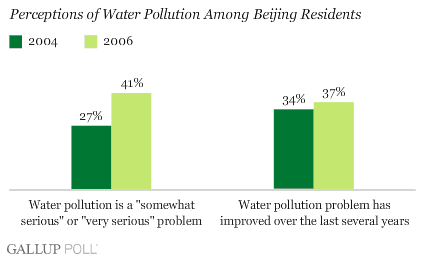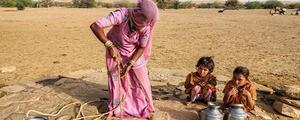GALLUP NEWS SERVICE
Princeton, NJ -- Beijing officials recognize that the city's water supply is in dire need of attention before the city can realize its dream of hosting a "Green Olympics" in 2008. Last November, the Beijing Municipal Environmental Protection Bureau reported on the toll that rapid economic growth, water shortages, and an expanding population have taken on surrounding lakes, rivers, and reservoirs. Only 2 of 16 lakes met the minimum grade for daily use and none of the eight major rivers even met the minimum standard for agricultural or landscaping use.
Beijing recently proposed investing $1.59 billion until 2010 to curb worsening water contamination and provide cleaner water by the start of the games. This massive project would include the construction of 35 new wastewater treatment plants that will treat 90% of urban Beijing's wastewater before it flows into nearby rivers and lakes.
Gallup asked Beijing residents two questions about water pollution in 2004 and again in 2006; the results suggest deepening concern among residents. In 2004, just 27% said water pollution was a serious problem where they lived; that number jumped to 41% in 2006. Roughly one-third of residents in both 2004 and 2006 said water quality had improved over the last several years.

Prior to winning the bid to host the Olympics, rapid development was far more prevalent in the Chinese psyche than preservation of the environment. However, the 2008 Olympics may have accelerated a change in awareness and perspective, at least among urban Chinese. There is hope that the games will leave a legacy of environmentalism behind in a city that urgently needs it.
Survey Methods
Results are based on face-to-face interviews conducted during October 2006 with a randomly selected sample of 422 Beijing residents, aged 15 and older. For results based on these samples, one can say with 95% confidence that the maximum error attributable to sampling and other random effects is ±5 percentage points. In addition to sampling error, question wording and practical difficulties in conducting surveys can introduce error or bias into the findings of public opinion polls.
